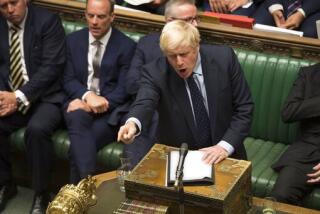Irish Premier Ignites New Controversy on N. Ireland : Britain: Reynolds’ call for ‘demilitarization’ prompts charges that he supports concessions to separatists.
- Share via
LONDON — The confusion over British-Irish government attempts to set up peace talks to end violence in Northern Ireland deepened Monday when Irish Prime Minister Albert Reynolds called for “demilitarization” of the troubled province.
Reynolds’ remark sparked a new controversy when it was interpreted by Ulster Unionists, who want to maintain British rule in Northern Ireland, as a hint of possible concessions to separatists who want to join Ireland.
On Dec. 15, Reynolds and British Prime Minister John Major issued a framework for peace negotiations, called the Downing Street Declaration, that would include supporters of the outlawed Irish Republican Army if the group would lay down its weapons.
“The time has come to start a process of demilitarization of the Northern conflict,” Reynolds said in a statement published in a Dublin newspaper. The statement came after Major said that neither he nor the Irish prime minister would discuss the declaration further until they received an official response from Sinn Fein, the political arm of the IRA.
John Bruton, leader of the opposition in Ireland’s Parliament, complained that Reynolds should have chosen his words more carefully. “Anything that is said that is not immediately clear as to what it means is something that should not be said in a situation as delicate and difficult as this,” he said.
“Unfortunately, the (prime minister) had used a phrase which could have a double meaning--and that is not a very wise thing for him to have done.”
The Rev. Ian Paisley, militant leader of the Democratic Unionist Party, said Reynolds’ comments showed that he had “come out in his true colors,” adding that the peace plan had on it “the bloody thumbprint of the IRA.”
In the past Sinn Fein has called for “demilitarization” of the province, signifying a British withdrawal.
And David Trimble, an Ulster Unionist member of Parliament, warned that Reynolds was “trying to pull the declaration closer to the IRA position. He signed the declaration and he is going beyond it. I hope Downing Street will proceed to rein him in as he goes off on a bit of frolic on his own.”
But a parliamentary supporter of the Irish government, Dermot Ahern, tried to explain Reynolds’ remarks by indicating that the prime minister was trying to get a message through to the IRA.
“I think Mr. Reynolds was trying to suggest yet again,” he said, “that if we had a peaceful atmosphere, if there was a lack of military presence--both from a paramilitary point of view and indeed, consequently, a British security point of view--things would be a lot easier for people on the island to sit together and attempt to sort out our differences.”
Ahern said the first step would be for the Catholic republican and Protestant Unionist paramilitary forces to put down their arms.
“Obviously, if that was the case, and if the security forces and the British government were aware of the fact this had taken place, then it would be possible for them, in effect, to go back to their barracks.”
Meanwhile, Martin McGuinness, a leading Sinn Fein figure, demanded clarification of the Downing Street Declaration and asked whether “this signaled the beginning of the process of bringing about an end to British rule in Ireland.”
More to Read
Sign up for Essential California
The most important California stories and recommendations in your inbox every morning.
You may occasionally receive promotional content from the Los Angeles Times.













